Expert Tips for Buying and Selling Sports Cards
In the dynamic and ever-evolving world of sports memorabilia, the art of buying and selling sports cards stands out as both a thrilling hobby and a potentially lucrative investment. Whether you're a seasoned collector eyeing the next valuable addition to your collection or a newcomer eager to dive into this fascinating market, understanding the intricacies of trading can be your key to success. This blog aims to equip you with expert tips and strategies, drawing from years of experience and market observation, to not only enhance your collection but also maximize your investment potential. Join us as we navigate through the do's and don'ts, the market trends, and the hidden gems of the sports card trading world, turning your passion into profit. Maximize your investment by storing your graded cards in a PSA slab holder designed for premium protection and organization.
1. Do your Research
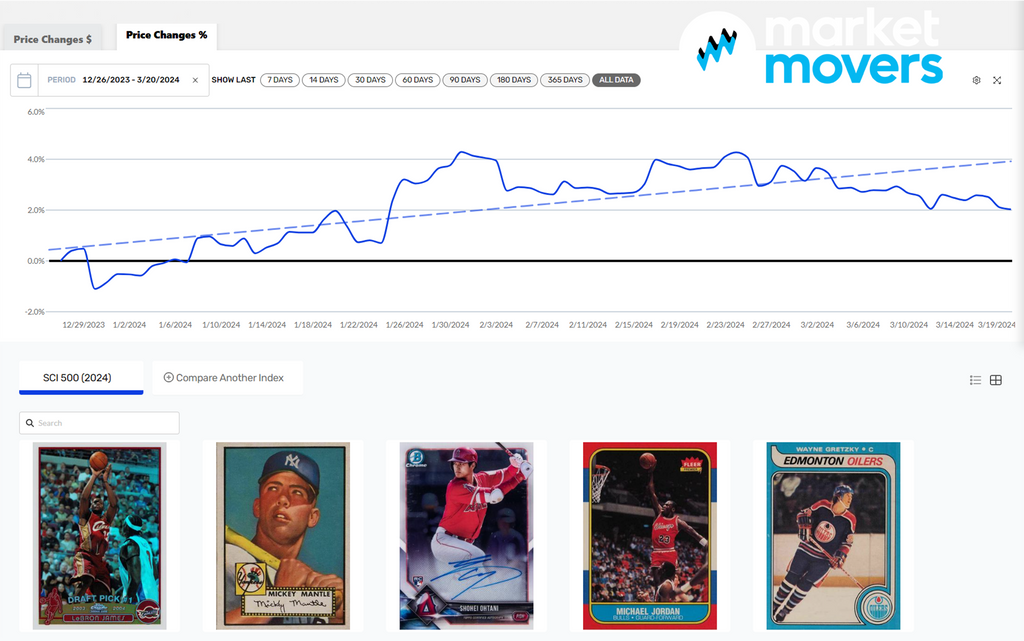
Before diving into buying or selling sports cards, it's essential to conduct thorough market research to make well-informed decisions. This process involves a detailed analysis to grasp the current market conditions. Key steps include evaluating the value of cards, examining recent sales figures, spotting trends, and carefully assessing any specific cards you’re interested in.
For those looking to understand the value of sports cards, 130point.com is a great tool. It's a user-friendly website that provides free access to a comprehensive database of sports card sales history from eBay, PWCC, Golid Auctions, and Myslabs, helping collectors accurately determine their cards' worth.
For individuals seeking more advanced options than 130point.com, Market Movers and Card Ladder are top choices. These platforms offer similar features but stand out with their distinctive interfaces, mobile apps, and extensive card databases. Users can easily add their collections and track card values like stock investments, enjoying superior monitoring tools.
The value of sports cards is affected by several factors, such as the card's condition, rarity, scarcity, and the fame of the athlete featured on the card. It's crucial to understand these aspects to navigate the sports card market effectively and make smart investment decisions based on thorough research.
2. Set a Budget and Stick to it
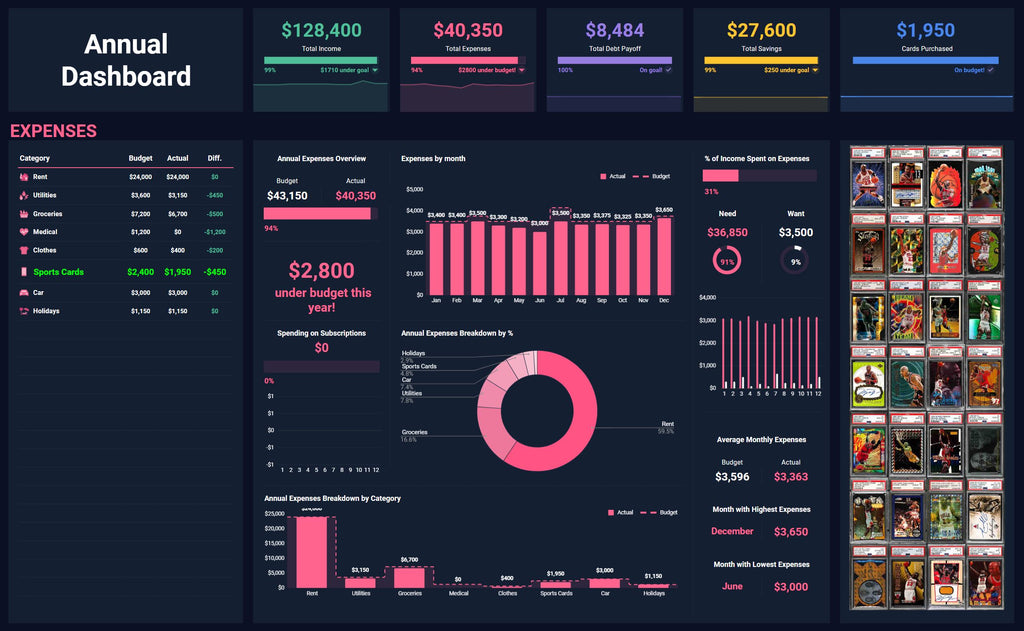
Many who delve into the world of sports card collecting and investing fall into the trap of spending beyond their means, whether on a single card or in building their collection. It's crucial to create a financial plan that fits your personal situation and to stick to it, especially if you're new to this hobby.
Setting up a budget requires carefully assessing your financial situation and deciding how much you're comfortable investing in sports cards. It's also wise to set spending limits on purchases related to certain players or teams as a smart way to control your expenses.
Adhering to your budget helps avoid financial stress and promotes a disciplined approach to collecting. Being financially cautious not only prevents you from overspending but also ensures that your purchases are well thought out, increasing your chances of making profitable investments. Moreover, by steering clear of overpaying for cards, you safeguard your potential profits and maintain the possibility of a successful return on your investment.
3. Diversify your Collection
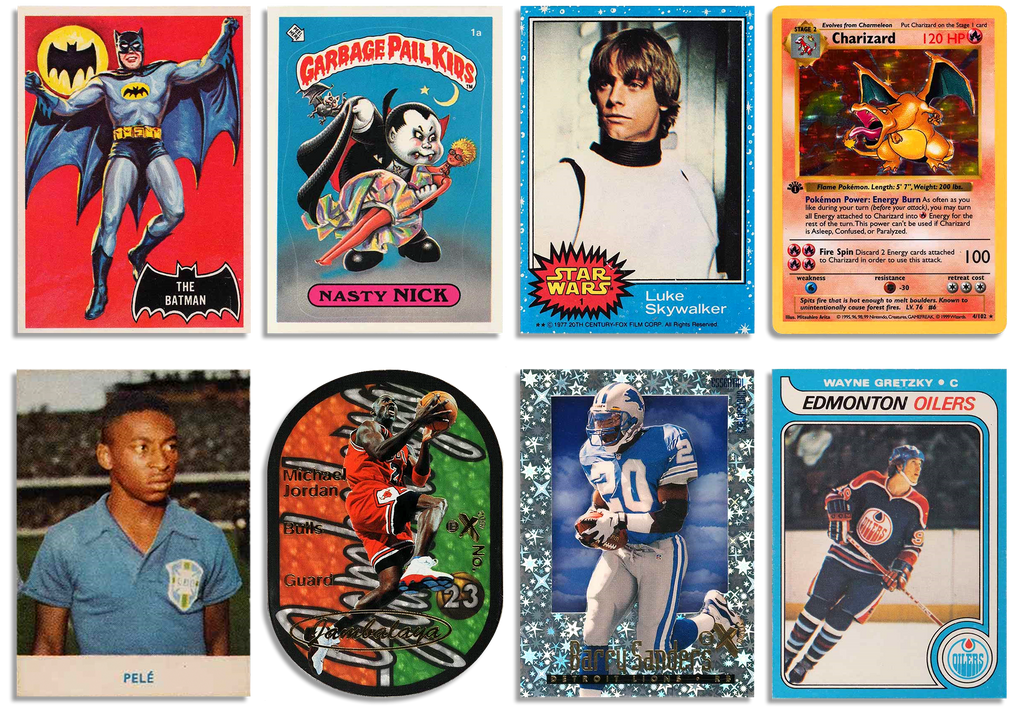
Diversification is a key principle in any investment strategy, and it's especially important when it comes to sports cards. Instead of focusing on one player or team, consider building a diverse collection that includes modern cards, vintage cards, and non-sports cards such as Pokemon. .
Diversifying your collection can help you minimize risk and maximize profits by providing a hedge against market fluctuations. For example, if the demand for a particular player's cards drops, you'll have other cards in your collection to fall back on.
Expanding your collection across various types of trading cards not only mitigates financial risk but also introduces new opportunities for profit. This strategic diversification enhances your knowledge and insight into different collectible categories. By adopting such a broad-based investment strategy, you unlock potential revenue streams that would likely remain hidden without embracing a wide-ranging approach to collecting.
4. Know the Value of your Cards
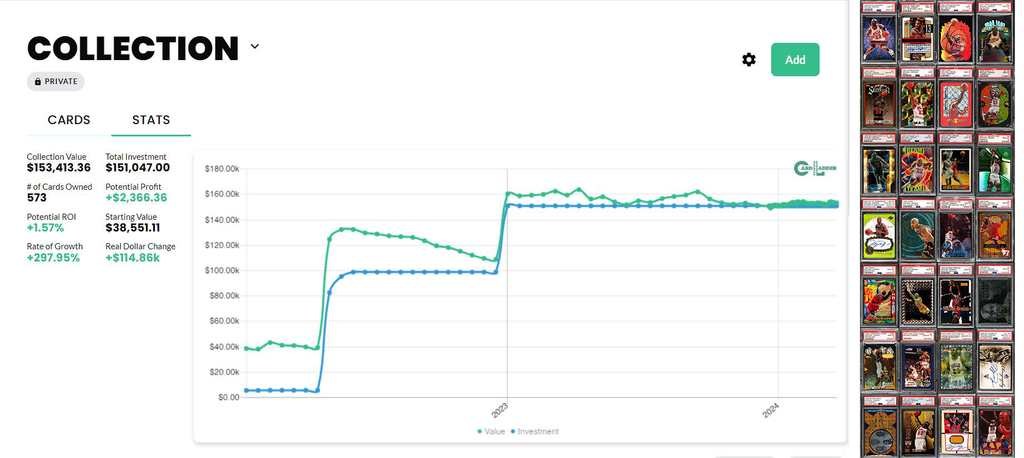
Mastering the ability to accurately assess the value of sports cards is a cornerstone of success in the buying and selling arena. This critical skill involves leveraging both price guides and online platforms to pinpoint a card's current market valuation, alongside a deep understanding of the various factors that can significantly influence a card's worth.
Several pivotal elements play a role in determining a card's value: the prominence of the player or team featured, the card's scarcity, its physical condition, and overall market demand. For instance, cards showcasing star athletes from major sports leagues typically command higher prices than those of less celebrated players from minor leagues. Similarly, a card in pristine, mint condition holds more value compared to one that shows signs of wear or damage.
To accurately value your sports cards, you can turn to several resources. Online tools such as the PSA Price Guide, Beckett Price Guide, and CardLadder offer comprehensive insights into current market values. Expert appraisals can also provide a detailed evaluation of your collection's worth. Additionally, exploring online marketplaces like eBay or COMC can give you a sense of the going rates for cards similar to yours, offering a real-time glimpse into the competitive landscape. By staying informed and utilizing these resources, you can make well-educated decisions, enhancing your success in the dynamic world of sports card trading.
5. Buy Low and Sell High
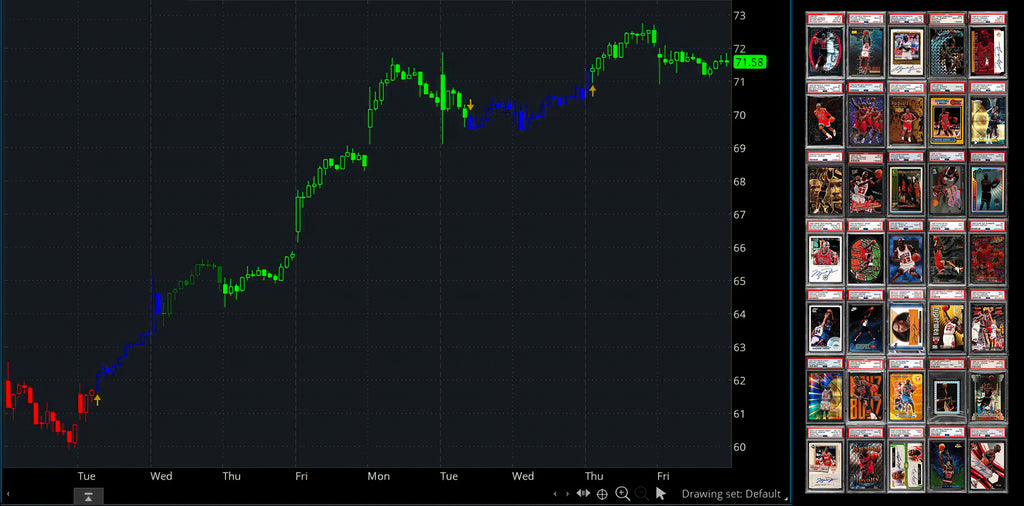
At the heart of savvy sports card trading lies the fundamental strategy of buying low and selling high. This involves identifying cards that are currently undervalued or priced below what they're worth and acquiring them at a bargain, with the aim of selling them at a higher price for a profit in the future.
To unearth these hidden gems, diligent research is key. Seek out cards that are being sold for less than their true market value. Additionally, scout for cards characterized by high demand yet limited availability, such as rare or special edition cards. Engaging in prospecting, which means investing in cards of athletes who show promise of rising to stardom, can also yield significant returns. This method requires a keen eye for talent and potential, as well as a good understanding of the sports involved.
When it's time to sell, adopting a strategic approach is crucial. Setting realistic prices and exercising patience can pay off significantly. Hastily selling your cards might lead to missed opportunities for higher profits. Waiting for the right buyer who recognizes the value of your card can result in more favorable sales outcomes.
Incorporating tools like Market Movers into your strategy can profoundly impact your success in sports card trading. Market Movers is a platform extensively used by sports card investors to analyze transaction histories and identify trends within the data. This analysis can spotlight potential deals and profitable investment opportunities that might not be immediately obvious. By leveraging such insights, investors can make informed decisions, spotting undervalued cards before they become widely recognized as such and capitalizing on market dynamics to maximize returns. This sophisticated approach allows traders to stay ahead in the competitive sports card market, turning well-researched investments into lucrative sales.
6. Protect your Investment
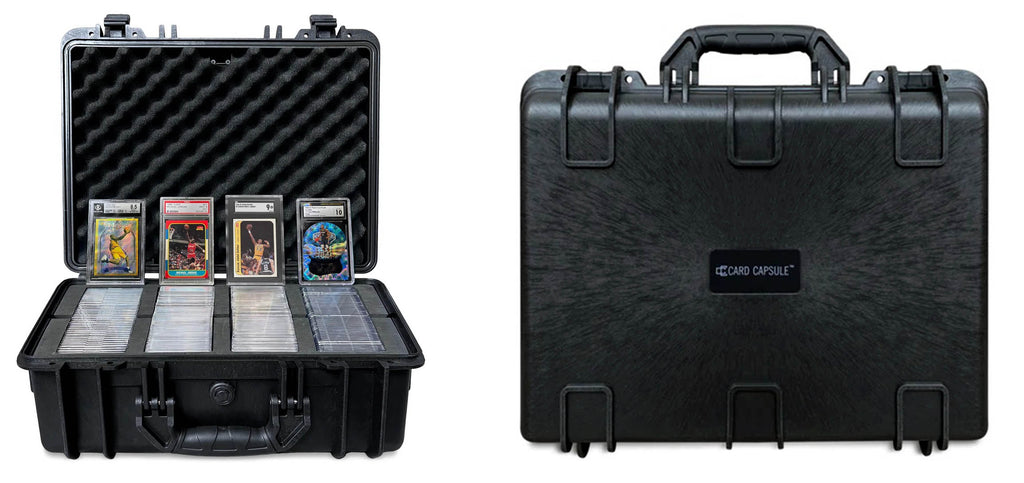
Just like any form of investment, ensuring the safety and integrity of your sports card collection is crucial. This includes protecting it from potential damage, theft, or fraudulent activities. Here are comprehensive steps to help secure your precious collection:
Proper Storage
Use Protective Gear: Invest in quality card sleeves, top loaders, card savers, or archival-quality storage boxes. These accessories are designed to shield your cards from physical damage, dust, and handling.
Climate Control: Store your cards in a controlled environment. Avoid places with extreme temperatures or high humidity, which can lead to warping, discoloration, or mold. Consider using a dehumidifier in damp areas and avoid direct sunlight.
Insurance Protection
Insure Your Collection: To safeguard against significant loss due to damage or theft, consider insuring your collection. Many home insurance policies can be extended to cover collectibles, but make sure to verify the specifics with your provider. Alternatively, seek out specialized insurers that offer tailored coverage for collectibles, ensuring your investment is protected under all circumstances.
Secure your collection with a durable sports card carrying case and ensure your valuable cards are protected on the go!
Vigilance Against Frauds
Beware of Fakes: The market is rife with counterfeit sports cards, making it essential to stay vigilant. When purchasing, opt for reputable dealers with positive reviews and verifiable histories.
Authentication and Grading: Utilize professional grading services to authenticate your cards. Organizations like PSA, Beckett Grading Services (BGS), or Sports Card Guaranty (SCG) not only authenticate but also grade your cards, adding to their value and trustworthiness.
Educational Resources: Familiarize yourself with the characteristics of genuine versus fake cards. Websites of trusted grading services often provide guidelines and tips for spotting counterfeits. Additionally, engaging with the community through forums or social media groups can offer insights and alerts about known scams.
Adding Security Measures
Digital Documentation: Keep a digital record of your collection, including photos, receipts, and any authentication certificates. This documentation can be invaluable for insurance claims or in recovering stolen items.
Physical Security: Depending on the value of your collection, consider additional security measures like safes or security systems. Even within your home, keeping your collection in a secure, less accessible location can deter potential theft.
7. Use Online Marketplaces

The advent of online marketplaces like eBay, MySlabs, and COMC (Check Out My Cards) has revolutionized the way collectors and investors engage with the sports card market, providing a streamlined platform for transactions that span the globe. These platforms have opened up new opportunities, making it significantly easier to find, buy, and sell sports cards across a wide spectrum of interests and values.
eBay: stands as a titan in the online marketplace, offering an expansive array of sports cards that cater to a diverse range of collectors and investors. With listings from both individual sellers and established dealers, eBay facilitates the search for specific cards or the exploration of collections by sport, player, or team. The platform's auction and buy-it-now options cater to different buying preferences, while its user rating system helps to ensure transactions are conducted with reputable sellers.
MySlabs: emerges as a specialized platform focusing on slabbed cards—those that have been graded and encased by professional grading services. This niche marketplace attracts collectors and investors who prioritize the condition and authenticity of their cards, offering a curated selection that emphasizes quality and trust. By concentrating on slabbed cards, MySlabs provides a unique service that appeals to serious collectors and those looking for investment-grade cards, with the added assurance that comes from graded items.
COMC (Check Out My Cards): offers a distinctive approach to buying and selling sports cards by facilitating direct transactions between collectors. This platform boasts an extensive catalog that spans various sports and historical periods, making it a treasure trove for enthusiasts seeking specific pieces or rarities. COMC's innovative system allows buyers to purchase cards and hold them in an online inventory, enabling the consolidation of purchases for streamlined shipping. This feature is particularly appealing for those looking to buy multiple cards over time without the immediate need for physical possession.
While the convenience and range of these online marketplaces are unparalleled, navigating them requires a cautious approach to safeguard your investments. It is vital to research sellers, understand the platforms' policies on disputes and returns, and make informed decisions based on accurate listings and descriptions. Additionally, being vigilant about the condition and authenticity of cards, especially when not purchasing slabbed or graded items, is crucial.
8. Join a Sports Card Community

Becoming a member of a sports card community or club presents an enriching avenue for enthusiasts to deepen their knowledge in the trading realm, forge connections with fellow collectors, and remain abreast of the latest trends and developments within the sports card collecting universe.
A plethora of sports card communities exist, spanning both digital and physical spaces, catering to diverse interests and preferences. Digital forums like the Sports Card Forum and Net54baseball offer vibrant online platforms where members can engage in discussions, seek advice, and exchange insights about the sports card market. Similarly, social media groups, particularly on platforms like Facebook, provide dynamic environments for collectors to share their finds, sell or trade cards, and discuss various aspects of collecting.
Physical gatherings, such as trade nights hosted by local sports card stores, offer tangible experiences for collectors to meet in person, trade cards, and share their passion for the hobby. These in-person events foster a sense of community and camaraderie among collectors, allowing for the exchange of knowledge and experiences in a more intimate setting.
Joining a sports card community or club can also serve as a gateway to discovering local and regional events that cater to sports card enthusiasts. Card shows, trade nights, and live auctions are just a few examples of events where collectors can engage directly with others, showcasing their collections, making purchases, or selling cards. These events not only provide opportunities for transactions but also help collectors stay informed about market values, rare finds, and collecting strategies.
Furthermore, membership in a sports card community can offer invaluable support for both novice and seasoned collectors. Whether it's navigating the complexities of card grading, understanding market trends, or simply seeking advice on managing a collection, the collective wisdom of a community can provide guidance and reassurance.
9. Consider Consigning your Cards

If you have a large collection of sports cards and don't want to deal with the hassle of selling them individually, you may want to consider consigning your cards to a dealer or auction house.
Consigning your cards means that you're entrusting a dealer or auction house to sell your cards on your behalf, typically for a percentage of the sale price. This can be a convenient way to sell your cards, especially if you don't have the time or expertise to sell them yourself.
Before consigning your cards, be sure to do your research and choose a reputable dealer or auction house. You should also carefully review the terms of the consignment agreement, including the fees, the sale price, and the length of the consignment period. Some of the most reputable consigners on eBay are Probstein Auctions, MC Sportscards, COMC, PC Sportscards, and DCSports87.
10. Stay Up-to-date on Trends and News
To truly excel in the realm of sports card collecting and investing, keeping a pulse on the latest market trends and news is indispensable. This proactive approach not only places you at the forefront of the game but also equips you with the insights needed to capitalize on emerging opportunities and navigate the market with confidence. Engaging with a variety of resources is key to building a well-rounded understanding of the sports card landscape.
Diving into the world of sports card news and blogs is a great starting point. These platforms are often the first to report on significant market shifts, spotlight rising stars in the sports world, and provide analyses on how current events might impact card values. By incorporating this habit into your routine, you ensure that you're always in the loop with the latest developments.
Subscribing to reputable sports card magazines or newsletters offers another layer of depth to your market knowledge. These publications often feature detailed articles, expert opinions, and comprehensive market analyses that can shed light on longer-term trends and investment strategies. They serve as an invaluable resource for those looking to deepen their understanding of the sports card industry and refine their approach to collecting and investing.
Furthermore, joining sports card communities or forums can significantly enhance your market awareness. These platforms foster discussions among collectors and investors from various backgrounds, offering a spectrum of perspectives on market dynamics. Here, you can share your insights, ask questions, and receive advice from seasoned collectors, creating a collaborative environment for learning and growth.
Conclusion
Buying and selling sports cards can be a rewarding and lucrative hobby, but it requires knowledge, skills, and strategy to be successful. By following these expert tips, you'll be on your way to building a profitable and diverse sports card collection. Keep your cards safe with our high-quality semi-rigid card holders—perfect for protecting and displaying your prized possessions.



Enjoy your cards. Try to really get some information about the players in your collection.
Leave a comment